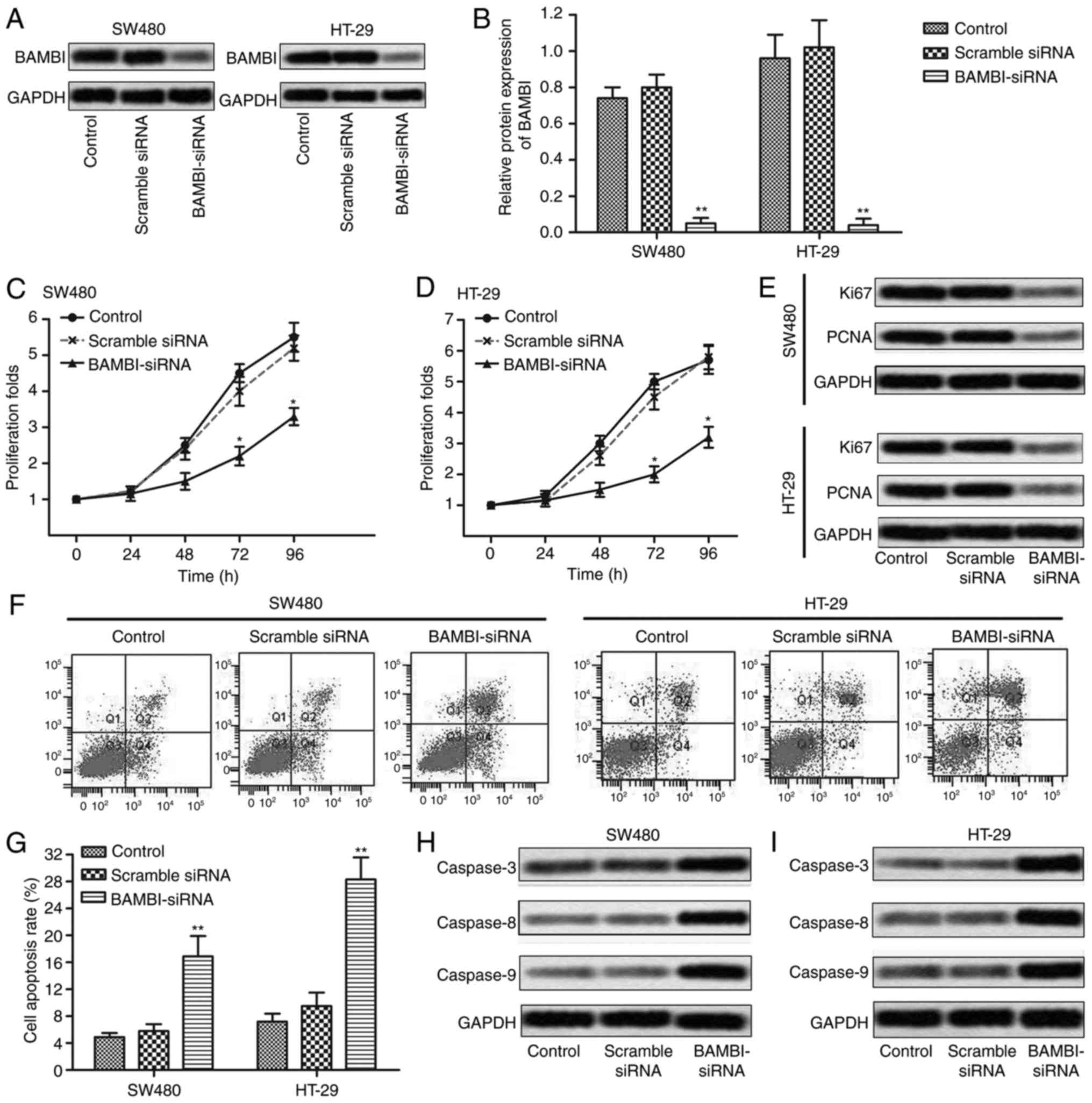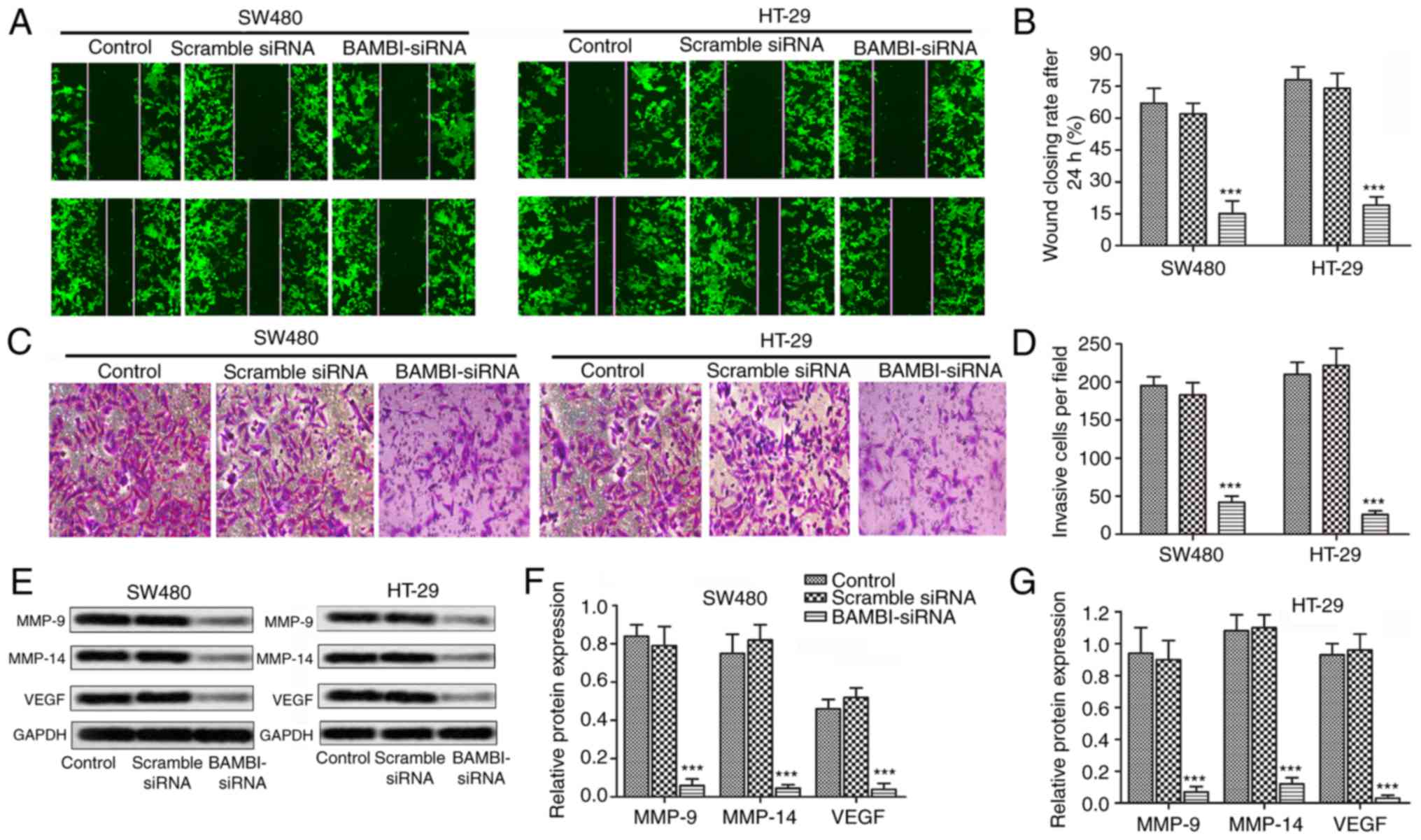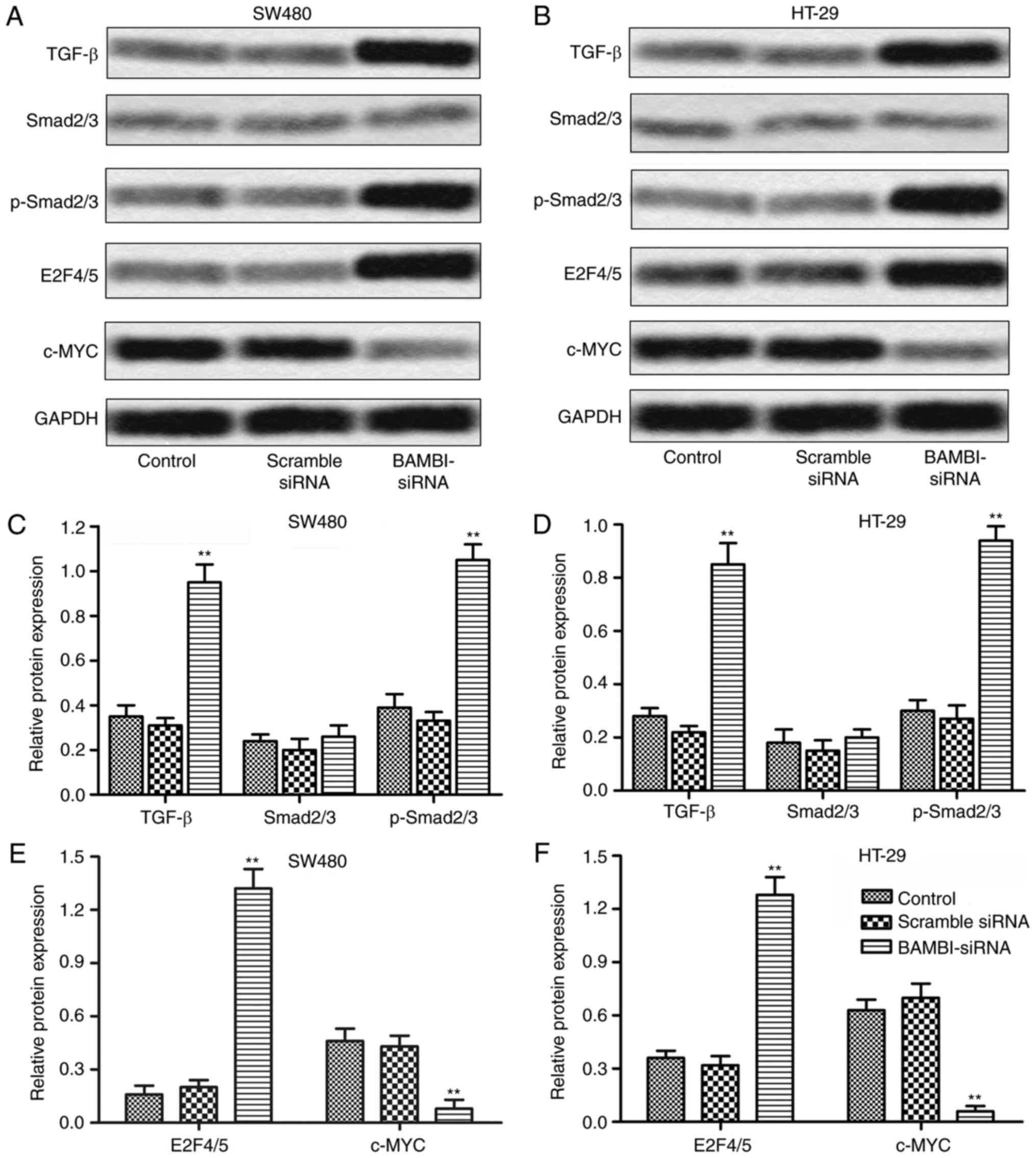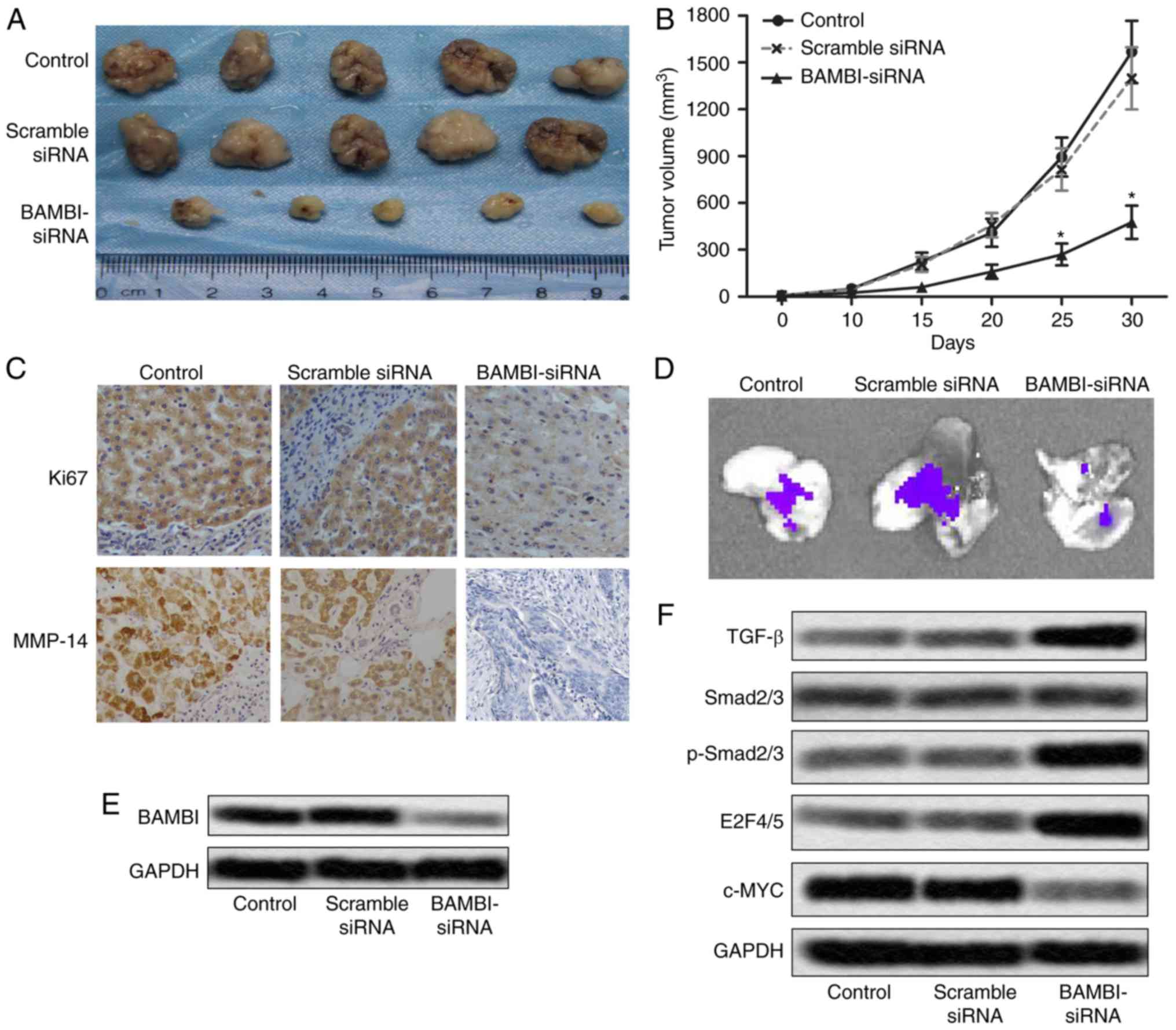|
1
|
Siegel RL, Miller KD and Jemal A: Cancer
statistics, 2016. CA Cancer J Clin. 66:7–30. 2016. View Article : Google Scholar : PubMed/NCBI
|
|
2
|
Pugh SA, Shinkins B, Fuller A, Mellor J,
Mant D and Primrose JN: Site and stage of colorectal cancer
influence the likelihood and distribution of disease recurrence and
postrecurrence survival: Data from the FACS randomized controlled
trial. Ann Surg. 263:1143–1147. 2016. View Article : Google Scholar : PubMed/NCBI
|
|
3
|
Parkin DM, Bray F, Ferlay J and Pisani P:
Global cancer statistics, 2002. CA Cancer J Clin. 55:74–108. 2005.
View Article : Google Scholar : PubMed/NCBI
|
|
4
|
Wolpin BM and Mayer RJ: Systemic treatment
of colorectal cancer. Gastroenterology. 134:1296–1310. 2008.
View Article : Google Scholar : PubMed/NCBI
|
|
5
|
Onichtchouk D, Chen YG, Dosch R, Gawantka
V, Delius H, Massagué J and Niehrs C: Silencing of TGF-beta
signalling by the pseudoreceptor BAMBI. Nature. 401:480–485. 1999.
View Article : Google Scholar : PubMed/NCBI
|
|
6
|
Degen WG, Weterman MA, van Groningen JJ,
Cornelissen IM, Lemmers JP, Agterbos MA, van Kessel Geurts A, Swart
GW and Bloemers HP: Expression of nma, a novel gene, inversely
correlates with the metastatic potential of human melanoma cell
lines and xenografts. Int J Cancer. 65:460–465. 1996. View Article : Google Scholar : PubMed/NCBI
|
|
7
|
Sasaki T, Sasahira T, Shimura H, Ikeda S
and Kuniyasu H: Effect of Nma on growth inhibition by TGF-betaa in
human gastric carcinoma cell lines. Oncol Rep. 11:1219–1223.
2004.PubMed/NCBI
|
|
8
|
Sekiya T, Adachi S, Kohu K, Yamada T,
Higuchi O, Furukawa Y, Nakamura Y, Nakamura T, Tashiro K, Kuhara S,
et al: Identification of BMP and activin membrane-bound inhibitor
(BAMBI), an inhibitor of transforming growth factor-beta signaling,
as a target of the beta-catenin pathway in colorectal tumor cells.
J Biol Chem. 279:6840–6846. 2004. View Article : Google Scholar : PubMed/NCBI
|
|
9
|
Oft M, Heider KH and Beug H: TGFbeta
signaling is necessary for carcinoma cell invasiveness and
metastasis. Curr Biol. 8:1243–1252. 1998. View Article : Google Scholar : PubMed/NCBI
|
|
10
|
Hata A, Shi Y and Massagué J: TGF-beta
signaling and cancer: Structural and functional consequences of
mutations in Smads. Mol Med Today. 4:257–262. 1998. View Article : Google Scholar : PubMed/NCBI
|
|
11
|
Grady WM, Myeroff LL, Swinler SE, Rajput
A, Thiagalingam S, Lutterbaugh JD, Neumann A, Brattain MG, Chang J,
Kim SJ, et al: Mutational inactivation of transforming growth
factor beta receptor type II in microsatellite stable colon
cancers. Cancer Res. 59:320–324. 1999.PubMed/NCBI
|
|
12
|
Bierie B and Moses HL: Tumour
microenvironment: TGFbeta: The molecular Jekyll and Hyde of cancer.
Nat Rev Cancer. 6:506–520. 2006. View
Article : Google Scholar : PubMed/NCBI
|
|
13
|
Ferlay J, Shin HR, Bray F, Forman D,
Mathers C and Parkin DM: Estimates of worldwide burden of cancer in
2008: GLOBOCAN 2008. Int J Cancer. 127:2893–2917. 2010. View Article : Google Scholar : PubMed/NCBI
|
|
14
|
Subramaniam N, Sherman MH, Rao R, Wilson
C, Coulter S, Atkins AR, Evans RM, Liddle C and Downes M:
Metformin-mediated Bambi expression in hepatic stellate cells
induces prosurvival Wnt/β-catenin signaling. Cancer Prev Res
(Phila). 5:553–561. 2012. View Article : Google Scholar : PubMed/NCBI
|
|
15
|
Miao S, Zhao L, Gao J, Wang H and Cui Z:
Distribution and mRNA Expression of BAMBI in Non-small-cell Lung
Cancer. Zhongguo Fei Ai Za Zhi. 12:203–207. 2009.(In Chinese).
PubMed/NCBI
|
|
16
|
Lin Z, Gao C, Ning Y, He X, Wu W and Chen
YG: The pseudoreceptor BMP and activin membrane-bound inhibitor
positively modulates Wnt/beta-catenin signaling. J Biol Chem.
283:33053–33058. 2008. View Article : Google Scholar : PubMed/NCBI
|
|
17
|
Zhang Y, Yu Z, Xiao Q, Sun X, Zhu Z, Zhang
J, Xu H, Wei M and Sun M: Expression of BAMBI and its combination
with Smad7 correlates with tumor invasion and poor prognosis in
gastric cancer. Tumour Biol. 35:7047–7056. 2014. View Article : Google Scholar : PubMed/NCBI
|
|
18
|
Khin SS, Kitazawa R, Win N, Aye TT, Mori
K, Kondo T and Kitazawa S: BAMBI gene is epigenetically silenced in
subset of high-grade bladder cancer. Int J Cancer. 125:328–338.
2009. View Article : Google Scholar : PubMed/NCBI
|
|
19
|
Liu K, Song X, Ma H, Liu L, Wen X, Yu J,
Wang L and Hu S: Knockdown of BAMBI inhibits β-catenin and
transforming growth factor beta to suppress metastasis of gastric
cancer cells. Mol Med Rep. 10:874–880. 2014. View Article : Google Scholar : PubMed/NCBI
|
|
20
|
Zhao JJ, Hao S, Wang LL, Hu CY, Zhang S,
Guo LJ, Zhang G, Gao B, Jiang Y, Tian WG and Luo DL: Long
non-coding RNA ANRIL promotes the invasion and metastasis of
thyroid cancer cells through TGF-beta/Smad signaling pathway.
Oncotarget. 7:57903–57918. 2016. View Article : Google Scholar : PubMed/NCBI
|
|
21
|
Rouce RH, Shaim H, Sekine T, Weber G,
Ballard B, Ku S, Barese C, Murali V, Wu MF and Liu H: The
TGF-β/SMAD pathway is an important mechanism for NK cell immune
evasion in childhood B-acute lymphoblastic leukemia. Leukemia.
30:800–811. 2016. View Article : Google Scholar : PubMed/NCBI
|
|
22
|
Jiang HL, Sun HF, Gao SP, Li LD, Hu X, Wu
J and Jin W: Loss of RAB1B promotes triple-negative breast cancer
metastasis by activating TGF-β/SMAD signaling. Oncotarget.
6:16352–16365. 2015. View Article : Google Scholar : PubMed/NCBI
|
|
23
|
Yu D, Shin HS, Lee YS and Lee YC: miR-106b
modulates cancer stem cell characteristics through TGF-β/Smad
signaling in CD44-positive gastric cancer cells. Lab Invest.
94:1370–1381. 2014. View Article : Google Scholar : PubMed/NCBI
|
|
24
|
Zhang B, Halder SK, Kashikar ND, Cho YJ,
Datta A, Gorden DL and Datta PK: Antimetastatic role of Smad4
signaling in colorectal cancer. Gastroenterology. 138(969–980):
e1–e3. 2010. View Article : Google Scholar
|
|
25
|
Togo N, Ohwada S, Sakurai S, Toya H,
Sakamoto I, Yamada T, Nakano T, Muroya K, Takeyoshi I, Nakajima T,
et al: Prognostic significance of BMP and activin membrane-bound
inhibitor in colorectal cancer. World J Gastroenterol.
14:4880–4888. 2008. View Article : Google Scholar : PubMed/NCBI
|
|
26
|
Shangguan L, Ti X, Krause U, Hai B, Zhao
Y, Yang Z and Liu F: Inhibition of TGF-β/Smad signaling by BAMBI
blocks differentiation of human mesenchymal stem cells to
carcinoma-associated fibroblasts and abolishes their protumor
effects. Stem Cells. 30:2810–2819. 2012. View Article : Google Scholar : PubMed/NCBI
|
|
27
|
Lee S, Lee MJ, Zhang J, Yu GR and Kim DG:
C-terminal-truncated HBV X promotes hepato-oncogenesis through
inhibition of tumor-suppressive β-catenin/BAMBI signaling. Exp Mol
Med. 48:e2752016. View Article : Google Scholar : PubMed/NCBI
|


















